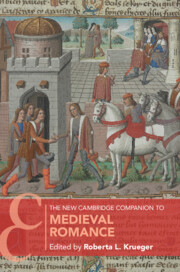Book contents
- The New Cambridge Companion to Medieval Romance
- The New Cambridge Companion to Medieval Romance
- Copyright page
- Contents
- Figures
- Contributors
- Acknowledgments
- Chronology
- Introduction
- 1 “For Love and For Lovers”
- 2 The Manuscript Contexts of Medieval Romance
- 3 Matters of Form
- 4 Authors, Narrators, and Their Stories in Old French Romance
- 5 Arthurian Transformations
- 6 Romance and the Medieval Mediterranean
- 7 The Crusading Romance in Britain
- 8 “Making Race” in Medieval Romance
- 9 The Construction and Interrogation of Gender in Old French Romance
- 10 Emotions as the Language of Romance
- 11 Medieval Iberian Romance
- 12 Medieval and Early Modern Italian Romance
- 13 German Medieval Romance
- 14 The Ends of Romance in Chaucer and Malory
- 15 French Romance in the Late Middle Ages and the Renaissance
- 16 Romance in Historical Context
- 17 Romance in Twentieth- and Twenty-First-Century Popular Culture
- Bibliography of Editions and Translations
- Index
- Cambridge Companions To …
- References
10 - Emotions as the Language of Romance
Published online by Cambridge University Press: 11 May 2023
- The New Cambridge Companion to Medieval Romance
- The New Cambridge Companion to Medieval Romance
- Copyright page
- Contents
- Figures
- Contributors
- Acknowledgments
- Chronology
- Introduction
- 1 “For Love and For Lovers”
- 2 The Manuscript Contexts of Medieval Romance
- 3 Matters of Form
- 4 Authors, Narrators, and Their Stories in Old French Romance
- 5 Arthurian Transformations
- 6 Romance and the Medieval Mediterranean
- 7 The Crusading Romance in Britain
- 8 “Making Race” in Medieval Romance
- 9 The Construction and Interrogation of Gender in Old French Romance
- 10 Emotions as the Language of Romance
- 11 Medieval Iberian Romance
- 12 Medieval and Early Modern Italian Romance
- 13 German Medieval Romance
- 14 The Ends of Romance in Chaucer and Malory
- 15 French Romance in the Late Middle Ages and the Renaissance
- 16 Romance in Historical Context
- 17 Romance in Twentieth- and Twenty-First-Century Popular Culture
- Bibliography of Editions and Translations
- Index
- Cambridge Companions To …
- References
Summary
This chapter argues that emotions are a way of practicing community, that feeling rules delineate the boundaries of what is acceptable and who can be part of the communities imagined within medieval romance. Attentiveness to the diction of emotions offers a new and potentially rich avenue of inquiry into how courtly readers imagined connection. Emotion words function like a contract between people: they negotiate, enact, and destroy relationships. And in romance, these utterances most frequently misfire, sowing confusion, misunderstanding, and, most of all, despair among the lovers and knights who are propelled to repair the damage of these misperformances to their relationships. Emotional misfirings – the moments where love fails, or where shame, anger, and grief take over – are the very building blocks through which romance negotiates and narrates elite communities.
Keywords
- Type
- Chapter
- Information
- The New Cambridge Companion to Medieval Romance , pp. 150 - 166Publisher: Cambridge University PressPrint publication year: 2023

